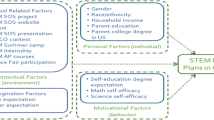Abstract
We examined midlife educational, career, and family outcomes of women who attended prestigious women's colleges in the 1960s. One college had a coeducational learning environment (CLE), the other was a single-sex environment (SLE). We hypothesized that in CLEs, exposure to men's standards of achievement might have resulted in greater educational and career status outcomes but more discrimination; in SLEs, there might have been fewer opportunities to engage with men intellectually, which could lead to lesser educational and career status outcomes, but the environment might have felt more supportive. Graduates of both colleges were very accomplished 30 years after graduation; however, those who had experienced a CLE reported more sexism and more active involvement in the women's movement than SLE graduates.
Similar content being viewed by others
REFERENCES
Agronick, G. S., & Duncan, L. E. (1998). Personality and social change: Individual differences, life path, and importance attributed to the women's movement. Journal of Personality and Social Psychology, 74, 1545–1555.
Arlen, M. J. (1962, June 10). The girl with the Harvard degree. The New York Times Magazine, 16, 63–65.
Astin, A. W. (1977). Four critical years. San Francisco: Jossey-Bass.
Brown, M. D. (1982). Career plans of college women: Patterns and influences. In P. J. Perun (Ed.), The undergraduate woman: Issues in educational equity (pp. 303–335). Lexington, MA: D.C. Heath.
Carr, D. (1960, January). So much better a B.A. than a MRS.? Baby Talk,p.13.
Cross, W. E., Jr. (1971). The Negro-to-Black conversion experience: Toward a psychology of Black liberation. Black World, 20, 13–27.
Cross, W. E., Jr. (1991). Shades of Black: Diversity in African-American identity. Philadelphia: Temple University Press.
Culotta, E., & Gibbons, A. (Eds.). (1992, November 13). Minorities in science [Special section]. Science, 258, 1176–1232.
Downing, N. E., & Roush, K. L. (1985). From passive acceptance to active commitment: A model of feminist identity development for women. Counseling Psychologist, 13, 695–709.
Duncan, L. E. (1999). Motivation for collective action: Group consciousness as mediator of personality, life experiences, and women's rights activism. Political Psychology, 20, 611–635.
Duncan, L. E., & Agronick, G. S. (1995). The intersection of life stage and social events: Personality and life outcomes. Journal of Personality and Social Psychology, 69, 558–568.
Giele, J. Z. (1987). Coeducation or women's education? A comparison of alumnae from two colleges: 1934–79. In C. Lasser (Ed.), Educating men and women together (pp. 91–109). Urbana: University of Illinois Press.
Harvard-Radcliffe yearbook. (1965). Cambridge, MA: Harvard University.
Hechinger, F. M. (1960, March 20). Education: Campus marriages. New York Times, p.E9.
Hechinger, F. M. (1962, April 25). Women's schools mail bids to 4,620. New York Times, pp. 1, 66.
Kaminer, W. (1998, April). The trouble with single-sex schools. Atlantic Monthly, pp. 22–36.
Mannes, M. (1960, January 2). Female intelligence: Who wants it? New York Times Magazine, pp. 11, 44, 48.
Marx, D. M., & Roman, J. S. (2002). Female role models: Protecting women's math test performance. Personality and Social Psychology Bulletin, 28, 1183–1193.
Miller-Bernal, L. (1989). College experiences and sex-role attitudes: Does a women's college make a difference? Youth and Society, 20, 363–387.
Miller-Bernal, L. (1993). Single-sex versus coeducational environments: A comparison of women students' experiences at four colleges. American Journal of Education, 102, 23–54.
Miller-Bernal, L. (2000). Separate by degree: Women students' experiences in single-sex and coeducational colleges. Boston: Peter Lang.
Newcomer, M. (1959). A century of higher education for American women. New York: Harper & Brothers Publishers.
Oates, M. J., & Williamson, S. (1978). Women's colleges and women achievers. Signs, 3, 795–806.
Oates, M. J., & Williamson, S. (1980). Comment on Tidball's “women's colleges and women achievers revisited.” Signs, 6, 342–345.
Onewoman, two lives. (1961, November 3). Time Magazine, pp. 68–73.
Radcliffe college undergraduate catalogue. (1960). Cambridge, MA: Radcliffe College.
Riordan, C. (1994). The value of attending a women's college: Education, occupation, and income benefits. Journal of Higher Education, 65, 486–510.
Smith, D. G. (1990). Women's colleges and coed colleges: Is there a difference for women? Journal of Higher Education, 61, 181–197.
Smith college bulletin: Catalogue number 1960–1961. (1960). Northampton, MA: Smith College.
Spencer, S. J., Steele, C. M., & Quinn, D. M. (1999). Stereotype threat and women's math performance. Journal of Experimental Social Psychology, 35, 4–28.
Steele, C. M. (1997). A threat in the air: How stereotypes shape intellectual identity and performance. American Psychologist, 52, 613–629.
Stewart, A. J. (1979). Educating women for success: Overcoming psychological barriers. New Directions for Education, Work, and Careers, 8, 21–32.
Stewart, A. J., & Healy, J. M., Jr. (1989). Linking individual development and social changes. American Psychologist, 44, 30–42.
Stewart, A. J., Ostrove, J. M., & Helson, R. (2001). Middle aging in women: Patterns of personality change from the 30s to the 50s. Journal of Adult Development, 8, 23–37.
Stewart, A. J., Settles, I. H., & Winter, N. J. G. (1998). Women and the social movements of the 1960s: Activists, engaged observers, and nonparticipants. Political Psychology, 19, 63–91.
Stewart, A. J., & Vandewater, E. A. (1993). The Radcliffe class of 1964: Career and family social clock projects in a transitional cohort. In K. D. Hulbert & D. T. Schuster (Eds.), Women's lives through time (pp. 235–258). San Francisco: Jossey-Bass.
Tidball, M. E. (1980). Women's colleges and women achievers revisited. Signs, 5, 504–517.
Tidball, M. E., & Kistiakowsky, V. (1976). Baccalaureate origins of American scientists and scholars. Science, 193, 646–652.
Tidball, M. E., Smith, D. G., Tidball, C. S., & Wolf-Wendel, L. E. (1999). Taking women seriously: Lessons and legacies for educating the majority. Phoenix, AZ: Oryx Press.
U.S. Bureau of the Census. (1996). Statistical abstract of the United States: 1996 (116th ed.). Washington, DC: Author.
Wolf-Wendel, L. E. (1998). Models of excellence: The baccalaureate origins of successful European American women, African American women, and Latinas. Journal of Higher Education, 69, 141–187.
Author information
Authors and Affiliations
Rights and permissions
About this article
Cite this article
Duncan, L.E., Wentworth, P.A., Owen-Smith, A. et al. Midlife Educational, Career, and Family Outcomes of Women Educated at Two Single-Sex Colleges. Sex Roles 47, 237–247 (2002). https://doi.org/10.1023/A:1021382626360
Issue Date:
DOI: https://doi.org/10.1023/A:1021382626360




